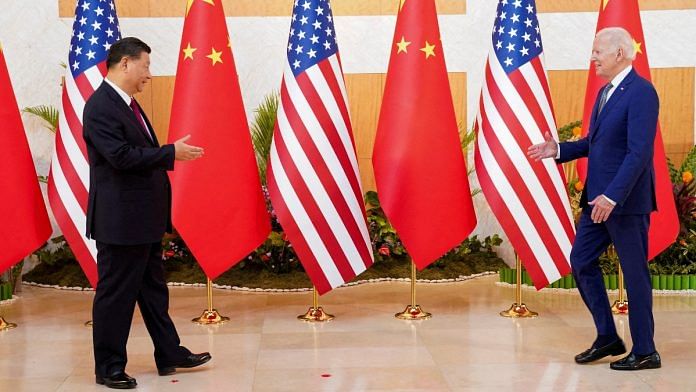Tensions in the Taiwan Strait reached unprecedented levels in 30-odd years after United States House speaker Nancy Pelosi made a daring visit to Taipei in August 2022. Beijing launched joint military exercises around the island, put about eight official military dialogues on hold, and pulled the plug on several cooperation channels with the US. The fury against the US landed heavily on Taiwan, which was subjected to missile, air, naval and cyber attacks.
Even before Pelosi’s visit, US-China relations had hit a low in July 2022 when American President Joe Biden, during a phone conversation with his Chinese counterpart Xi Jinping, ignored China’s concerns about tariff reductions and raised apprehensions about Taiwan instead. Xi reportedly told Biden: “Public opinion shall not be violated. And if you play with fire, you get burned. Hope the US side can see this clearly.”
Earlier in May 2022, during the run-up to the Chinese Communist Party’s (CCP) 20th National Congress, Yang Jiechi, former director of the CCP’s Central Foreign Affairs Commission, warned that Beijing will “resolutely respond to any scheme, rhetoric or act by the US side to contain China or take China down”. On its side, the US did not conceal its displeasure over Beijing escalating tensions in the South China Sea and China’s unbridled support to Russia’s military action in Ukraine. Besides, several Chinese companies were blacklisted from doing business with American corporates. The political, diplomatic, and economic crisis stopped short of spiralling into an armed conflict, though low-key.
But things seem to have taken a different course now.
Also read: Most important agreement Xi & Biden can make—keep AI out of nuclear warmaking decisions
US and China need each other
What could have happened in these 16 months that the two bitter rivals decided to bury the hatchet? They’re ready to sit down for a four-hour chat and sign agreements to revisit the stalled defence cooperation.
It is likely that economic headwinds could have forced a strong pro-reforms lobby in the CCP to advise Xi to insulate the Chinese manufacturing industry from avoidable US sanctions, export controls, and other restrictions. Xi’s meetings with the US business community and leading industrialists on the sidelines of the Asia-Pacific Economic Cooperation (APEC) meeting betrays the urgency in Beijing. US imports of goods from China rose to $536 billion and trade between the two countries hit an all-time high of $690.6 billion in 2022, clearly suggesting the inevitable need of the US market for Chinese manufacturers. China also needs a huge global fund infusion into its equity market, the allocation of which has dipped to 1.75 per cent in 2023 from 3.13 in 2015 — that is, before the Covid-19 pandemic and Russia-Ukraine conflict.
No country, not the least the US, would invest in risky markets. As for US dependence on China, the latter is the second largest foreign creditor to Washington, holding $835.4 billion of US Treasuries at the end of June 2023, according to recent data from the US Department of the Treasury; Japan being the largest creditor, holding $1.11 trillion.
Education plays an important role in facilitating not only people-to-people contact but also in technology transfer in the higher education sector. Students from India and China account for nearly 53 per cent of the over one million foreign students in the US, though the number of American students in China fell to just 211 in 2021-22, the lowest level in over two decades.
Also read: Will Xi’s ‘dear friend’ Putin help stop the economic damage China faces? Question for…
No permanent friends
India, a strong votary of non-alignment and multilateralism against competition between two hegemonic powers, should be concerned over the sudden friendship between Biden and Xi. The new closeness is a clear indication that the two superpowers are seeking to undermine the multilateralism emerging among the regional and middle powers. The September G20 summit in India witnessed remarkable unity among 20 economies of the world on pressing global concerns such as climate financing and Sustainable Development Goals (SDGs) despite serious differences on contentious issues and individual national stands on the Russia-Ukraine conflict.
The summit and other balancing acts by India have demonstrated New Delhi’s capability to respond to sudden changes in great power rivalry or camaraderie. In any case, it is time for India to wait and watch how long the current US-China tête-à-tête lasts. Incidentally, a little later after the four-hour meeting and pious intentions to ‘pick up the phone anytime and talk’ and handshakes, Biden called Xi a dictator in a press conference.
Even as Xi and Biden met to mend their bilateral relations, India and China continued to remain locked in a military standoff. Delhi cannot do normal business with Beijing as long as the threat in the north continues and China maintains its hold over Tibet and Xinjiang.
India and the US recently agreed on the commonality of interests on strategic issues, including countering China’s aggression, promoting a free and open Indo-Pacific, and addressing regional security challenges. While the US will have to clear its stand on the current status of the Quad, Aukus, and Indo-Pacific Economic Framework (IPEF), Delhi will have to overcome its apprehensions about the Regional Comprehensive Economic Partnership (RCEP) and fearlessly engage with regional economic architectures. The government’s serious efforts notwithstanding, the push for Atmanirbhar Bharat has not reduced dependence on Chinese consumer goods and raw materials for domestic manufacturers.
As the adage goes, there are no permanent enemies or friends in geopolitics, only permanent interests.
Seshadri Chari is the former editor of ‘Organiser’. He tweets @seshadrichari. Views are personal.
(Edited by Humra Laeeq)



